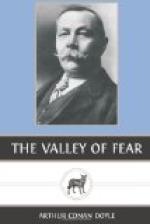Do not think that I intrude one story before another is finished. As you read on you will find that this is not so. And when I have detailed those distant events and you have solved this mystery of the past, we shall meet once more in those rooms on Baker Street, where this, like so many other wonderful happenings, will find its end.
Part 2 — The Scowrers
Chapter 1 — The Man
It was the fourth of February in the year 1875. It had been a severe winter, and the snow lay deep in the gorges of the Gilmerton Mountains. The steam ploughs had, however, kept the railroad open, and the evening train which connects the long line of coal-mining and iron-working settlements was slowly groaning its way up the steep gradients which lead from Stagville on the plain to Vermissa, the central township which lies at the head of Vermissa Valley. From this point the track sweeps downward to Bartons Crossing, Helmdale, and the purely agricultural county of Merton. It was a single track railroad; but at every siding—and they were numerous—long lines of trucks piled with coal and iron ore told of the hidden wealth which had brought a rude population and a bustling life to this most desolate corner of the United States of America.
For desolate it was! Little could the first pioneer who had traversed it have ever imagined that the fairest prairies and the most lush water pastures were valueless compared to this gloomy land of black crag and tangled forest. Above the dark and often scarcely penetrable woods upon their flanks, the high, bare crowns of the mountains, white snow, and jagged rock towered upon each flank, leaving a long, winding, tortuous valley in the centre. Up this the little train was slowly crawling.
The oil lamps had just been lit in the leading passenger car, a long, bare carriage in which some twenty or thirty people were seated. The greater number of these were workmen returning from their day’s toil in the lower part of the valley. At least a dozen, by their grimed faces and the safety lanterns which they carried, proclaimed themselves miners. These sat smoking in a group and conversed in low voices, glancing occasionally at two men on the opposite side of the car, whose uniforms and badges showed them to be policemen.
Several women of the labouring class and one or two travellers who might have been small local storekeepers made up the rest of the company, with the exception of one young man in a corner by himself. It is with this man that we are concerned. Take a good look at him; for he is worth it.




